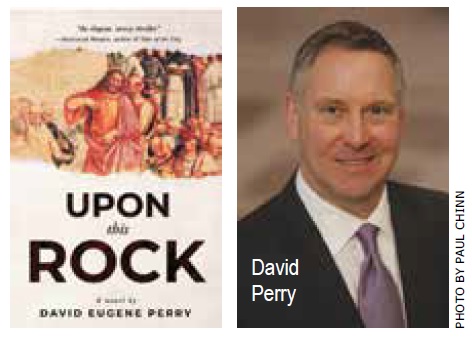
By Eric Jansen–
“Upon This Rock” is a tangled-web crime mystery set in Italy and Vatican City, with Catholic corruption, hidden homos, suicide, international terrorism, and the refugee crisis in the mix. Despite those heavy themes, it’s a fun distraction from current reality.
The novel is David Eugene Perry’s first. To be published September 1, it has already earned glowing praise. “Perry has written an elegant, twisty thriller in which a gay couple investigates a mysterious suicide in a scenic Italian hill town,” writes Tales of the City author Armistead Maupin.
Perry is well-known in San Francisco for, among other accomplishments, co-founding the Rainbow Honor Walk—plaques honoring LGBTQ heroes inset in Castro District sidewalks—and his high-profile public relations firm.
Upon This Rock is at once an easy and complex read. Perry’s humor and wit shine throughout, interspersed with meticulous historical detail in plotlines that span decades, even centuries.

It opens with the apparent suicide of a young deacon who hurls himself off the cliffs of Orvieto after The Vatican denied his priest ordination due to rumors that he was gay. Perry was driven to write the novel after learning of the actual suicide of a deacon in nearly identical circumstances four years before Perry and husband Alfredo Casuso first arrived in the small Umbrian city.
For Perry, who seriously considered the priesthood early in life, the deacon’s suicide hit home. “I became obsessed. Everyone in Orvieto clearly loved this young man, and I thought, his life needs to be made artful,” Perry said in a recent Out in the Bay radio interview. ( www.OutintheBay.org )
Lines between fact and fiction seem purposefully blurred. Protagonist Lee, like Perry, is a San Francisco PR pro originally from Virginia, and husband Adriano, like Casuso, is a designer of Spanish descent.
Perry and Casuso had flown to Orvieto for respite after the deaths of four dear friends in a very short time: Tom Dross, Felipe Sanchez Paris and his husband Otis Charles—the first openly gay bishop of any Christian faith—and the Rev. Anthony Turney of Grace Cathedral. The couple cared for Charles and Turney in their final months and were with them when they died.
“There’s more than a little of all those men in the character of Brian Swathmore,” says Perry. Similarly, Lee and Adriano fled to Orvieto for a break after the recent death of cleric Swathmore, the best friend they had cared for until his final breath and whose ashes they brought with them.
Perry incorporates real-life characters too, including 16th century Pope Clement VII, Clement’s cousin and predecessor Leo X (“the gayest Pope in history” says Perry), and current Pope Francis, and brings in World War II events.
Fact and fiction interact to challenge assumptions about how the world works. What seems fantastic in the novel may be actually quite possible—a chilling commentary on humanity.
“I’m a history nut, so the book is impeccably researched,” said Perry. “Everything from 2013 on, when the book is set, is fiction.” And while “dialogue is theorized,” all before then—World War II events, Swiss Guard sex scandals at The Vatican, Clement VII living in exile in Orvieto and enjoying an extravagant Passover feast hosted by a Jewish banker who has cached ancient Etruscan sculptures—is based on meticulous research.
Perry said, “Nothing would make me happier than seeing someone touring Orvieto with my book in hand, seeing places and wondering, ‘Did that really happen here?’ and I can tell you, it absolutely did.”
Refugees figure prominently. Dawud and sister Maryam have managed—barely—to escape from war-torn Libya. Their importance emerges as the book unfolds. And while Upon This Rock has Catholic Church struggles with sexuality at its center, Perry says that, in many ways, it is more about refugees: “Adriano is a refugee from his very religious Catholic family; Lee is a refugee from the racism of the South; Pope Clement is a refugee—he had to flee for his life from Rome dressed as a beggar. Everyone in the book, in a sense, is a refugee.”
With that in mind, I see how even Grigori, the super-hunky bisexual former Swiss Guard-turned escort, is a refugee from being treated for years as a sex object. (Perry hopes that if the book becomes a film, he’ll get to cast Grigori. “He’ll be fun to cast,” said Perry with a chuckle. “It will take a special actor indeed to fill that role!”)
Orvieto itself is a character in Upon This Rock, which reads like a love letter to Orvieto much as Tales of the City is a love letter to San Francisco. Perry hopes COVID will subside enough that he can give a reading in Orvieto this fall.
That should be a treat for Orvietans, as Perry reads his work with feeling and flair many authors don’t muster. Hear him read passages and share more about his inspiration for Upon This Rock in our Out in the Bay conversation. It’s the July 21 podcast post at www.OutInTheBay.org
For more information about Perry and Upon This Rock (Pace Press, September 2020):
Longtime journalist Eric Jansen is the founding producer and lead host of “Out in the Bay – Queer Radio from San Francisco,” which aired on KALW for 11 years, and now airs on KSFP – 102.5 FM in SF and is podcast on Stitcher, Apple, and other podcast platforms. He also announces for NPR affiliate KQED-FM, has written for many print and online publications, and performs narration and voice-overs.
Published on August 13, 2020
Recent Comments